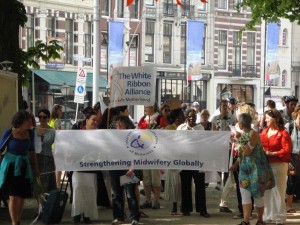
by Donna May Lyons, REI Communications & Fundraising Assistant
Recognizing and tackling global inequalities in maternal and newborn mortality
May 5th is celebrated annually as Cinco de Mayo, but it also marks the International Day of the Midwife. The health and well-being of people in developing countries is of great importance, and is one of REI’s goals of helping people help themselves by increasing the capacity of a nation’s most valuable resource – its human resource.
According to Dr. Babatunde Osotimehin, the Executive Director of the UN Population Fund (UNFPA), “more than one in three women in developing countries give birth alone, and in some of the poorest countries, as few as 13 percent of all deliveries are assisted by a midwife or a health worker with midwifery skills.” Dr. Osotimehin noted that UNFPA estimates that “1,000 women die every day and 5,500 newborns die in the first week of life for lack of adequate medical care.”
The International Day of the Midwife is a day annually committed to tackling global inequalities in maternal and newborn mortality, and to highlight local issues and conditions in midwifery services. It is also a day of recognizing the significant impact that midwives have on the health of women and newborns around the world and particularly in developing nations.
According to Dr. Osotimehin, there is currently a global shortage of some 350,000 midwives, and due to a lack of investment in midwifery education, regulation, and association, the global services that are available are unequally distributed between and within countries. With over 340,000 women dying annually, and millions more suffering infection and disability as a result of preventable maternal causes, it is critical that there be greater access to essential midwifery care worldwide, particularly in developing countries where 90 percent of maternal deaths occur.
The UNFPA and the World Health Organization (WHO), along with its partners, will release in June the first ever State of the World’s Midwifery report, which will address some of the critical issues surrounding the profession. They will also join thousands of midwives in June at the Triennial Midwives Congress in Durban, South Africa, to discuss human resources for health and the way forward.
How is Resource Exchange International (REI) building people to build nations and helping in the area of fetal and maternal mortality and morbidity in developing countries?
REI has been completing successful development work and relationship-building for over twenty years. An example of their work in pediatric medicine includes their memorandum of understanding (MOU) with Mittaphab Hospital in Vientiane Laos. Under the agreement, REI conducts training in Executive Leadership and Management and provides thorough assessments of several of the hospital’s major programs including OB/GYN. REI also conducts training in Basic and Advanced Neonatal Resuscitation, and “trains the trainers” who then pass on their newly acquired knowledge and skills to the regional and provincial hospitals throughout Laos.
Check back frequently to learn more about how REI is building people to build nations around the globe. Click here if you’d like to assist REI in its efforts.
Photos by the International Confederation of Midwives


 Keep up with REI's work overseas by reading our blog! Subscribe by email or by feed.
Keep up with REI's work overseas by reading our blog! Subscribe by email or by feed.